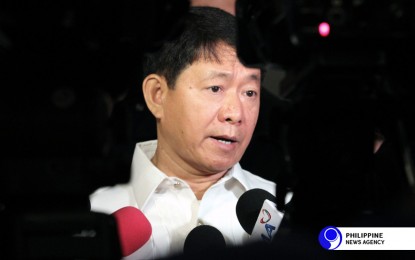
DILG Secretary Eduardo M. Año. File photo
MANILA -- Department of the Interior and Local Government (DILG) Secretary Eduardo M. Año is standing by the proposal to revive the anti-subversion law to put an end to the communist insurgency.
Año emphasized that the Communist Party of the Philippines (CPP), its armed wing, the New People’s Army (NPA) and its front organizations have been in an organized armed conspiracy for the past 50 years to overthrow the duly-elected government not only by force or violence but also by deceit, propaganda, and other illegal means.
“It’s about time that we put an end to this conflict that has been bringing our nation down and has killed some 100,000 policemen, soldiers, government officials and innocent civilians. If we truly want to end this scourge of society, the Anti-Subversion Act is urgent, critical, and inevitable,” Año said in a statement on Wednesday.
The DILG chief also stressed the proposal to revive the Anti-Subversion Law is only for members of the CPP-NPA-NDF (National Democratic Front) and all groups directly supporting it.
“It only covers the communists who are actively working to overthrow the government through armed struggle and does not, in any way, cover legitimate dissent, political opposition, or similar groups,” Año said.
“We are ready to work with Congress to craft such a legislation that responds to the needs of the times and places the necessary safeguards to ensure our Constitutionally-guaranteed freedoms of association and free speech,” he added.
He said that, in retrospect, the repeal of the anti-subversion law in 1992 may have been a mistake because the communist movement gained momentum in many areas and it grew bolder with the support of legal front organizations in urban areas from where they derive logistics, funding, source of cadres, and other forms of support.
“The repeal of the anti-subversion law was a demand of the CCP-NPA-NPF for the conduct of the peace talks in the 1990s. In good faith, the government acceded to those demands for the sake of peace. But instead of laying down their arms and joining mainstream society, the communists grew bolder and used the democratic space accorded to them to regroup, organize, and mobilize,” he explained.
Año said since the repeal of the anti-subversion law, the communists have continuously rejected the government’s call for genuine peace for the past 50 years and have instead indiscriminately sowed terrorism across the country.
He said the CPP’s constitution -- which is available on the internet -- categorically states that its goal is to overthrow the democratic, republican system using the weapons of “revolutionary armed struggle and the national united front.”
“Its program declares that this is to be done by building guerrilla fronts “to encircle the cities from the countryside… until it becomes possible to seize power in the cities,” he added.
He said it can’t be denied by anyone that the continued existence and illegal activities of the CPP-NPA-NDF constitute a clear, present, and grave danger to the security of the Philippine state.
“If we revive the anti-subversion law, we will be able to dismantle the urban mass movement in the cities that fuels the armed struggle in the mountains. We will be able to stifle their so-called ‘legal front organizations’ that provides sustenance to the underground mass organizations. It will be the beginning of an inevitable end,” he explained.
He cited the continuous active recruitment of some 500 to 1,000 youth annually by legal communist front organizations in schools and universities where some 50 to 100 of them become armed members of the NPA.
Año said all organizations providing support to the CPP-NPA-NDF must also be declared illegal and mere membership to these organizations should be a criminal act.
In response to criticism that there are enough laws available to law enforcement, he replied that “our present laws, the Revised Penal Code, and special penal laws only penalize the individual acts of communist terrorist groups while the revival of the anti-subversion law would declare illegal the mere recruitment or membership to these illegal organizations. The Human Security Act is also deficient.”
He added that reinstating the anti-subversion law is crucial in realizing the mandate of Executive Order (EO) 70, series of 2018 which created the National Task Force to End Local Communist Armed Conflict (NTF-ELCAC) and institutionalized the whole-of-nation approach in attaining inclusive and sustainable peace.
The Anti-Subversion Act or Republic Act 1700 was passed in June 1957 during the presidency of Carlos P. Garcia. It declared the CPP illegal as an organized conspiracy to overthrow the government for the purpose of establishing in the Philippines a totalitarian regime.
During the martial law period, RA 1700 was expanded through Presidential Decree (PD) 885 in 1976 and PD 1835 in 1981. These decrees made it a subversive criminal act to be affiliated with a group and attend a meeting or take part in any activity meant to overthrow the government with the open or covert assistance and support of a foreign power.
During the time of President Corazon Aquino, she issued Executive Order 167, series of 1987 repealing PDs 1835 and 1975 and reviving RA 1700. And in 1992, President Fidel Ramos signed RA 7636 repealing RA 1700. Subversion is no longer a criminal offense, but sedition remained a crime.
Año pointed out that in the United States their Communist Control Act of 1954 has not been repealed until now.
“That’s why it’s impossible for subversive organizations to thrive in the United States. So again, quashing communism does not entail the hands of the military forces but the definite hands of the law,” he said. (PR)
